反义疑问句课件(共27张PPT)
图片预览
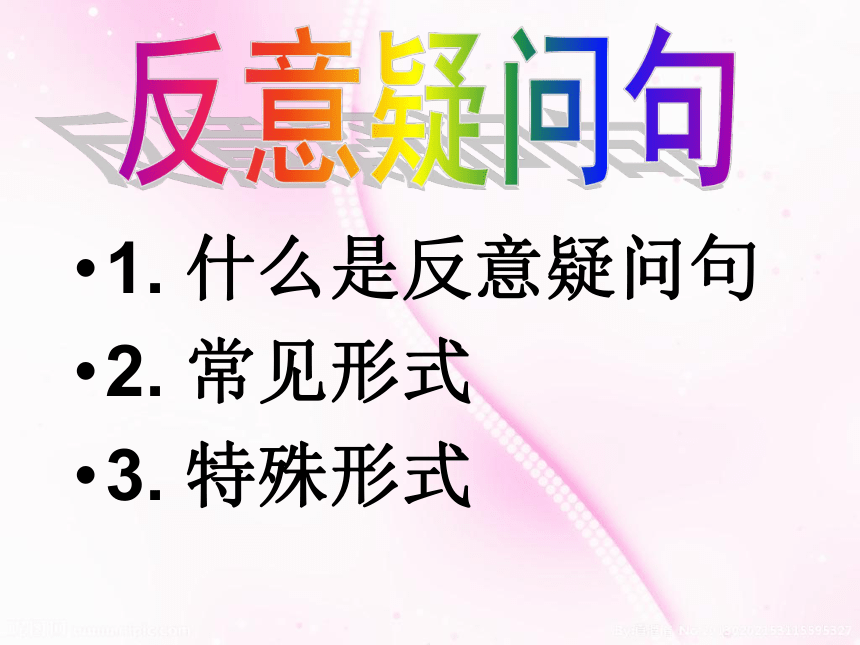
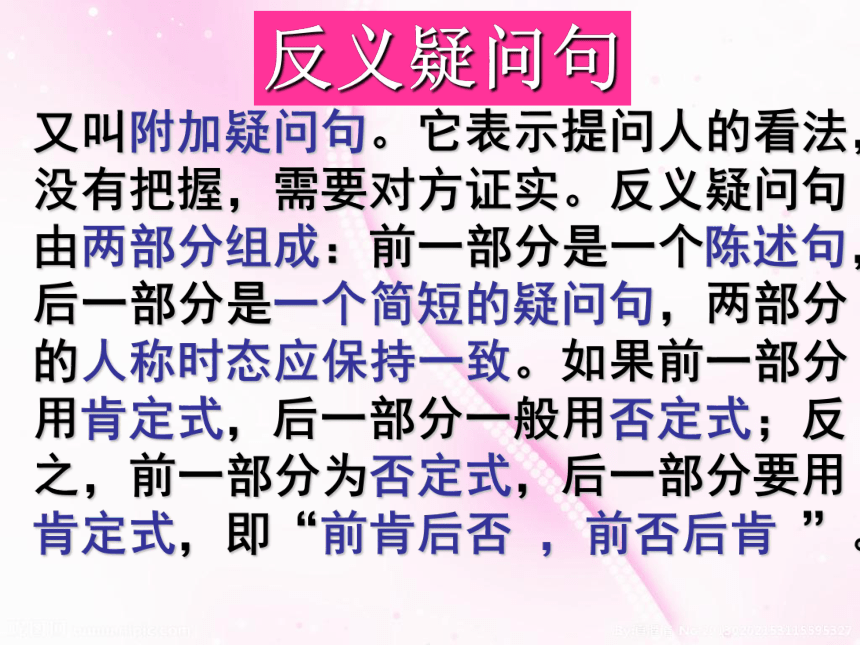
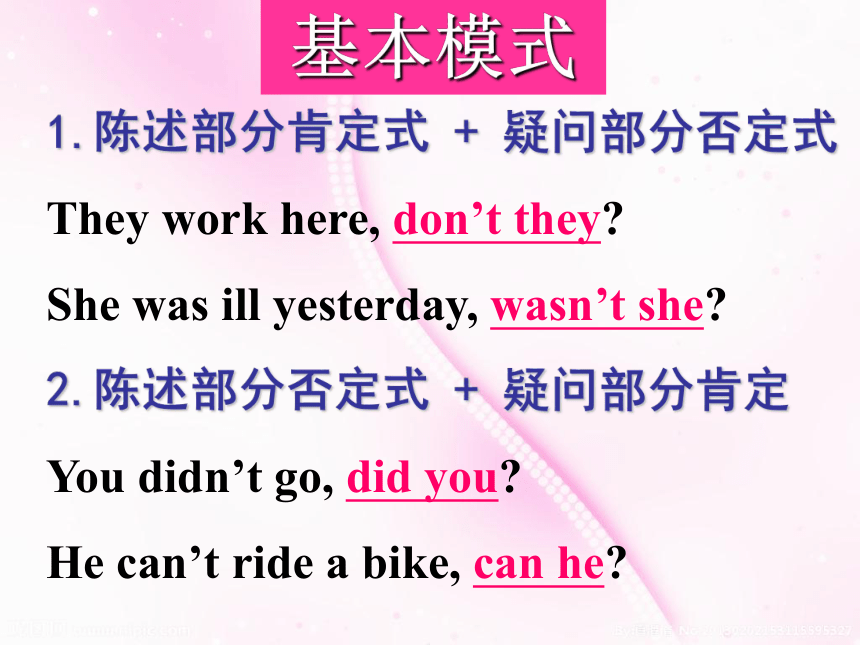


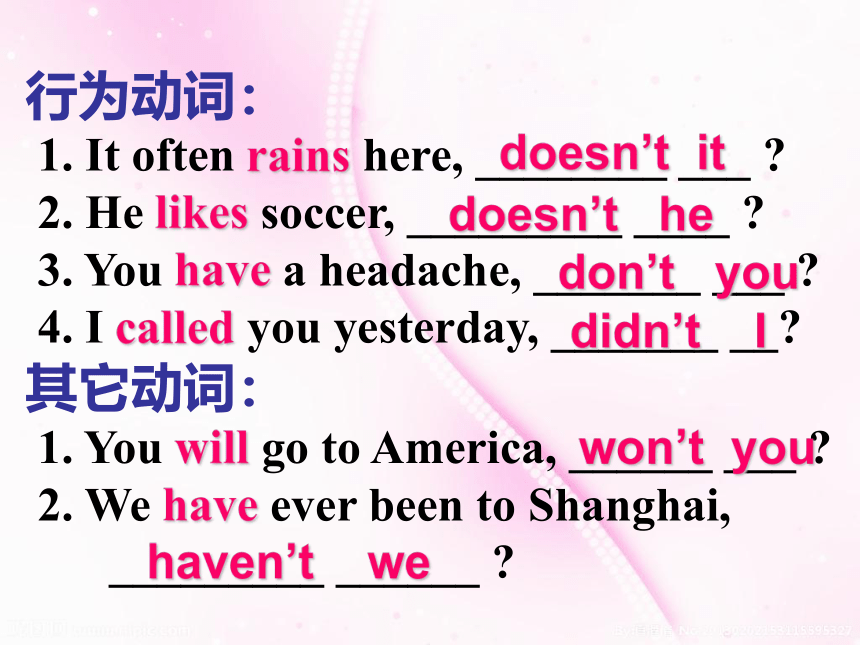
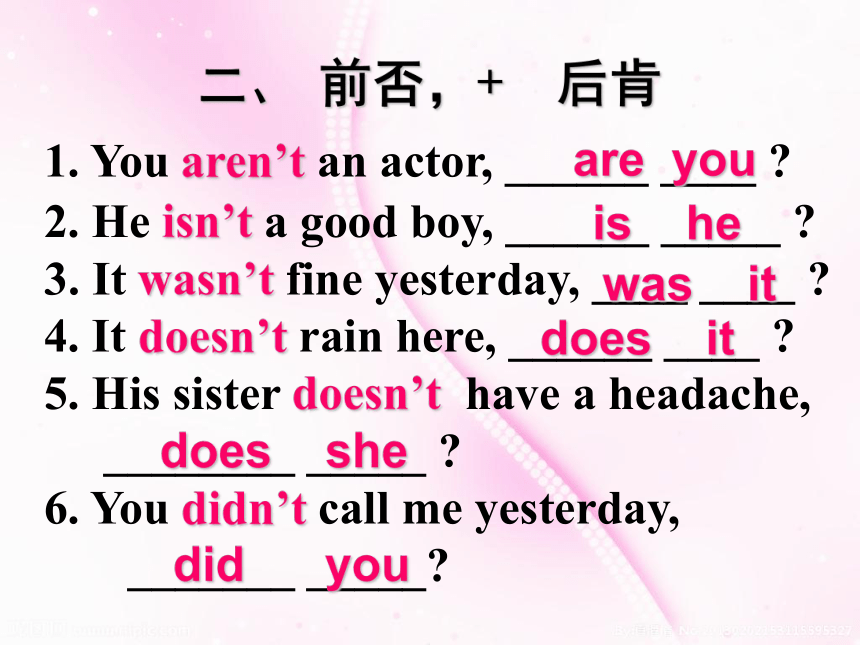
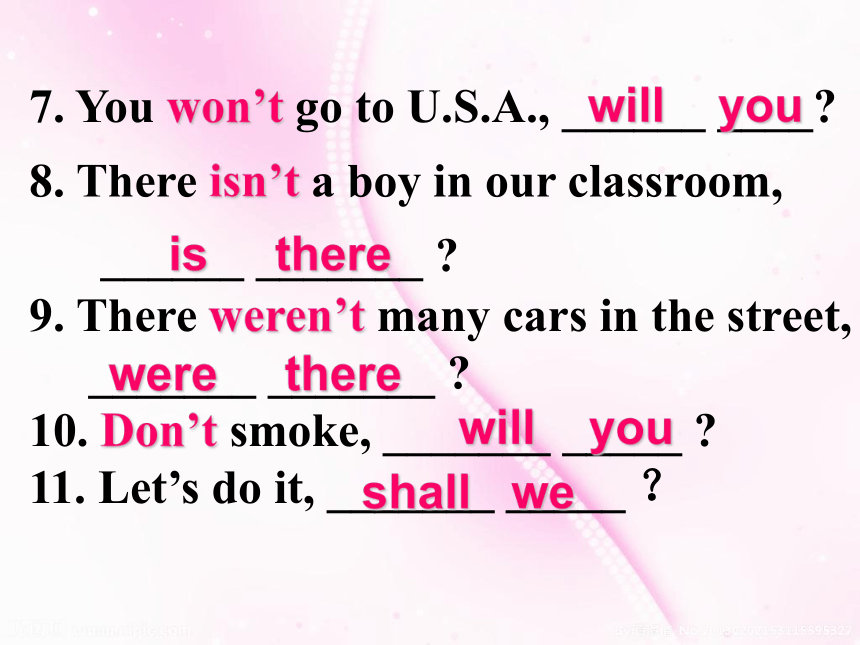
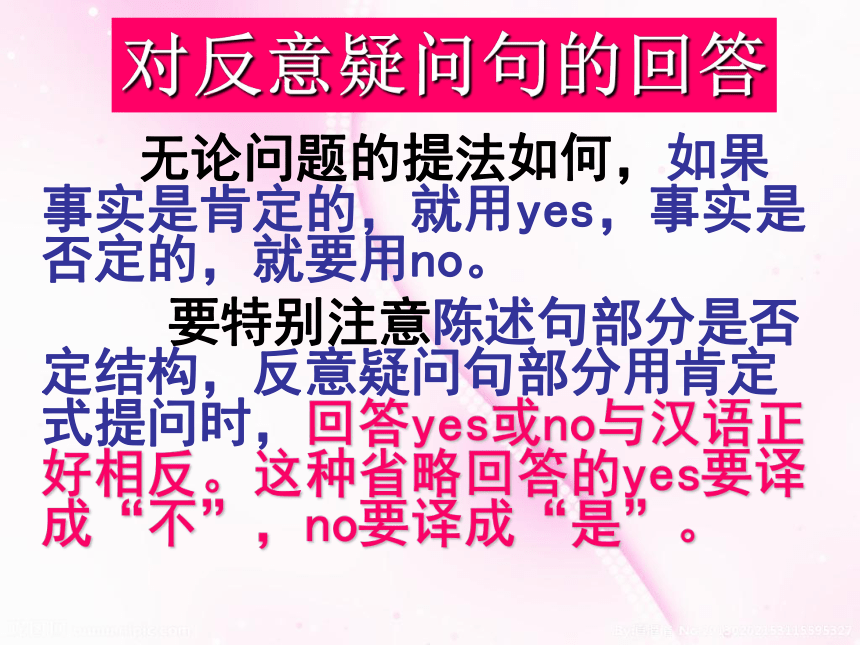
文档简介
(共27张PPT)
1. 什么是反意疑问句
2. 常见形式
3. 特殊形式
又叫附加疑问句。它表示提问人的看法,没有把握,需要对方证实。反义疑问句由两部分组成:前一部分是一个陈述句,后一部分是一个简短的疑问句,两部分的人称时态应保持一致。如果前一部分用肯定式,后一部分一般用否定式;反之,前一部分为否定式,后一部分要用肯定式,即“前肯后否 ,前否后肯 ”。
反义疑问句
1.陈述部分肯定式 + 疑问部分否定式
They work here, don’t they
She was ill yesterday, wasn’t she
2.陈述部分否定式 + 疑问部分肯定
You didn’t go, did you
He can’t ride a bike, can he
基本模式
当陈述部分的主语是I,而句子又用来征询对方的 意见时,附加疑问句中的主语用you。如:
I find English very interesting, don’t you
I don’t like that film, do you
一、 前肯,+ 后否
be 动词:
1. You are an actor, ________ _____
2. He is a good boy, ________ ______
3. It was fine yesterday, _______ ___
4. You were studying when I called
you last night, __________ _____
5. She is going to visit me, _____ ____
6. I am Chinese, ______ ______
aren’t you
isn’t he
wasn’t it
weren’t you
isn’t she
aren’t I
行为动词:
1. It often rains here, ________ ___
2. He likes soccer, _________ ____
3. You have a headache, _______ ___
4. I called you yesterday, _______ __
其它动词:
1. You will go to America, ______ ___
2. We have ever been to Shanghai,
_________ ______
doesn’t it
doesn’t he
don’t you
didn’t I
won’t you
haven’t we
二、 前否,+ 后肯
1. You aren’t an actor, ______ ____
2. He isn’t a good boy, ______ _____
3. It wasn’t fine yesterday, ____ ____
4. It doesn’t rain here, ______ ____
5. His sister doesn’t have a headache,
________ _____
6. You didn’t call me yesterday,
_______ _____
are you
is he
does it
does she
was it
did you
7. You won’t go to U.S.A., ______ ____
8. There isn’t a boy in our classroom,
______ _______
9. There weren’t many cars in the street,
_______ _______
10. Don’t smoke, _______ _____
11. Let’s do it, _______ _____ ?
will you
is there
were there
will you
shall we
无论问题的提法如何,如果事实是肯定的,就用yes,事实是否定的,就要用no。
要特别注意陈述句部分是否定结构,反意疑问句部分用肯定式提问时,回答yes或no与汉语正好相反。这种省略回答的yes要译成“不”,no要译成“是”。
对反意疑问句的回答
1.----He's a doctor, isn't he 他是医生,对吧
----Yes, he is.对,他是医生。
(No, he isn't.不,他不是医生。)
2.----He isn't a doctor, is he 他不是医生,对吧
----Yes, he is.不,他是医生。
(No, he isn't.对,他不是医生。)
1.He likes playing football, doesn’t he
他喜欢踢足球,是吗?
---Yes, he does. / No, he doesn’t.
是的。/ 不是
2.His sister didn’t attend the meeting, did she
他妹妹没有参加会议,是吗?
---Yes, she did. / No, she didn’t.
不,她参加了。/ 是的,她没参加。
1.It’s cold ,___________
肯定回答
2.They are playing football,
肯定回答
3.They don’t like swimming,_________
否定回答
4.Jay sings many songs,
肯定回答
5. Lily was ill in bed, _________
肯定回答
6. She wasn’t at home, _______
否定回答
isn’t it
Yes,it is.
aren’t they
Yes, they are.
do they
No, they don’t.
doesn’t he
Yes, he does.
Yes, she was.
wasn’t she
was she
No, she wasn’t.
1.The students were in the classroom, ________ 肯
2.They weren’t in the zoo last Sunday, _______ 否
3.It rained heavily yesterday, _______ 肯
4.Liu Xiang won the hurdle race again, _______ 肯
5.There was a heavy snow last year,
_________ 肯
Yes, they were.
weren’t they
No, they weren’t.
were they
didn’t it
Yes, it did.
Yes, he did.
didn’t he
Yes, there was.
wasn’t there
特殊用法1 ---祈使句的反意疑问句:
在祈使句后面附加问句,以加强语气或使祈使句听起来较委婉、客气。附加问句可选用 “will you ”“won’t you ”。
祈使句为否定结构时,附加问句一般只用 “will you ”.
陈述句为 “Let’s…” 结构时, 表示建议,其意思包括对方,即“让我们(你我双方)”附加问句一般用 “shall we ” 。
陈述句为 “Let us/me…” 结构时, 表示请求,其意思不包括对方,即“你让我们…(You let us)”,附加问句一般用 “will you ”
1. Sit down please, _______________
2. Please call me, _________________
3. Let’s go home, ________________
4. Let us go home, ________________
5. Don’t leave now, ________________
will / won’t you
shall we
will / won’t you
will you
will / won’t you
特殊用法2 情态动词的反义疑问句
陈述句+情态动词的简短否定/ 肯定+主语
1) He can play the piano,_________
2) He should go right now, __________
3)They can’t finish it, ___________
can’t he
shouldn’t he
can they
特殊用法3---There be句型的反意疑问句。
陈述句为There be结构时,附加问句仍用there。
1.There is a famous doctor in your hometown, ______________
2.There are many visitors in Beijing now, __________________
3.There will not be any classes tomorrow, _________________
4.There wasn’t anything new on TV last night, _____________
isn’t there
aren’t there
will there
was there
特殊用法4
陈述部分如果有否定意义的词,如:hardly(几乎不), never(从不), no, nobody, nowhere, nothing, few, little, no, seldom(很少), too…to(太…以至于不能) 等, 这时疑问部分要用肯定形式。
1.Mr. Smith can hardly speak Chinese, ________
2.She has never been to Hong Kong, ___________
3.There is nothing important in the newspaper, ______________
4.Few people eat wild animals now, _________
5.He knows little German, ____________
6.You have seldom met him recently, ________ ?
7.He is too young to join the army, __________
has she
is there
do they
does he
have you
is he
can he
否定前缀不能视为否定词,其反意疑问句仍用否定形式。
It is unpolite, isn't it
He is not unkind to his classmates, is he
特殊用法5
主语是everyone, someone, anyone, no one, nobody, none等不定代词时,反意疑问句的主语一般用they指代。
1.Everyone in your family is fond of swimming, aren’t they 你们全家都喜欢游泳,是吗?
2.Anyone can do that, ___________
3.Someone is knocking at the door, __________
4.No one knows about it, __________
can’t they
aren’t they
don’t they
特殊用法6
主语是everything, something, anything, nothing,that, this, 或动词不定式、动名词短语或从句时,反意疑问句的主语一般用it指代。
1.Nothing is important for him, is it
2.Something is wrong with your computer, ______________
3.Everything is ready for the test, __________
一切都准备好了,对吗?
To give up a bad habit is not easy, is it
What he said is true, isn’t it
isn’t it
isn’t it
特殊用法7
含有must的反意疑问句的情况:
A. must在表示推测“一定,肯定”时,反意疑问部分与must后面的
动词呼应,根据其推测的情况来确定反意疑问句。
He must be a doctor,___
You must be joking,___
isn't he
aren’t you
B. must 表示“必须”,疑问部分为needn’t
They must hand in their papers right now, needn’t they
C.当陈述部分为mustn’t,表示“禁止”时,反意疑问部分用must.
You mustn’t smoke in the room, must you
特殊用法8
陈述部分有 have to + v. (had to + v.),疑问部分常用don't +主语(didn't +主语)。
We have to get there at eight tomorrow, don't we
They had to cross the busy street, didn’t they
特殊用法9
上述部分主句的主语是第一人称I 、we,谓语是think, believe, 等引导的宾语从句,疑问部分与宾语从句相对应构成反意疑问句, 并要注意否定转移。
We believe she can do it better,___
I don't think he is bright,___
注意:当主句主语不是第一人称时,反意疑问句的助动词和人称代词要与主句保持一致。Mary thinks you will come to the party,___
can't she
is he
doesn’t she
1. 什么是反意疑问句
2. 常见形式
3. 特殊形式
又叫附加疑问句。它表示提问人的看法,没有把握,需要对方证实。反义疑问句由两部分组成:前一部分是一个陈述句,后一部分是一个简短的疑问句,两部分的人称时态应保持一致。如果前一部分用肯定式,后一部分一般用否定式;反之,前一部分为否定式,后一部分要用肯定式,即“前肯后否 ,前否后肯 ”。
反义疑问句
1.陈述部分肯定式 + 疑问部分否定式
They work here, don’t they
She was ill yesterday, wasn’t she
2.陈述部分否定式 + 疑问部分肯定
You didn’t go, did you
He can’t ride a bike, can he
基本模式
当陈述部分的主语是I,而句子又用来征询对方的 意见时,附加疑问句中的主语用you。如:
I find English very interesting, don’t you
I don’t like that film, do you
一、 前肯,+ 后否
be 动词:
1. You are an actor, ________ _____
2. He is a good boy, ________ ______
3. It was fine yesterday, _______ ___
4. You were studying when I called
you last night, __________ _____
5. She is going to visit me, _____ ____
6. I am Chinese, ______ ______
aren’t you
isn’t he
wasn’t it
weren’t you
isn’t she
aren’t I
行为动词:
1. It often rains here, ________ ___
2. He likes soccer, _________ ____
3. You have a headache, _______ ___
4. I called you yesterday, _______ __
其它动词:
1. You will go to America, ______ ___
2. We have ever been to Shanghai,
_________ ______
doesn’t it
doesn’t he
don’t you
didn’t I
won’t you
haven’t we
二、 前否,+ 后肯
1. You aren’t an actor, ______ ____
2. He isn’t a good boy, ______ _____
3. It wasn’t fine yesterday, ____ ____
4. It doesn’t rain here, ______ ____
5. His sister doesn’t have a headache,
________ _____
6. You didn’t call me yesterday,
_______ _____
are you
is he
does it
does she
was it
did you
7. You won’t go to U.S.A., ______ ____
8. There isn’t a boy in our classroom,
______ _______
9. There weren’t many cars in the street,
_______ _______
10. Don’t smoke, _______ _____
11. Let’s do it, _______ _____ ?
will you
is there
were there
will you
shall we
无论问题的提法如何,如果事实是肯定的,就用yes,事实是否定的,就要用no。
要特别注意陈述句部分是否定结构,反意疑问句部分用肯定式提问时,回答yes或no与汉语正好相反。这种省略回答的yes要译成“不”,no要译成“是”。
对反意疑问句的回答
1.----He's a doctor, isn't he 他是医生,对吧
----Yes, he is.对,他是医生。
(No, he isn't.不,他不是医生。)
2.----He isn't a doctor, is he 他不是医生,对吧
----Yes, he is.不,他是医生。
(No, he isn't.对,他不是医生。)
1.He likes playing football, doesn’t he
他喜欢踢足球,是吗?
---Yes, he does. / No, he doesn’t.
是的。/ 不是
2.His sister didn’t attend the meeting, did she
他妹妹没有参加会议,是吗?
---Yes, she did. / No, she didn’t.
不,她参加了。/ 是的,她没参加。
1.It’s cold ,___________
肯定回答
2.They are playing football,
肯定回答
3.They don’t like swimming,_________
否定回答
4.Jay sings many songs,
肯定回答
5. Lily was ill in bed, _________
肯定回答
6. She wasn’t at home, _______
否定回答
isn’t it
Yes,it is.
aren’t they
Yes, they are.
do they
No, they don’t.
doesn’t he
Yes, he does.
Yes, she was.
wasn’t she
was she
No, she wasn’t.
1.The students were in the classroom, ________ 肯
2.They weren’t in the zoo last Sunday, _______ 否
3.It rained heavily yesterday, _______ 肯
4.Liu Xiang won the hurdle race again, _______ 肯
5.There was a heavy snow last year,
_________ 肯
Yes, they were.
weren’t they
No, they weren’t.
were they
didn’t it
Yes, it did.
Yes, he did.
didn’t he
Yes, there was.
wasn’t there
特殊用法1 ---祈使句的反意疑问句:
在祈使句后面附加问句,以加强语气或使祈使句听起来较委婉、客气。附加问句可选用 “will you ”“won’t you ”。
祈使句为否定结构时,附加问句一般只用 “will you ”.
陈述句为 “Let’s…” 结构时, 表示建议,其意思包括对方,即“让我们(你我双方)”附加问句一般用 “shall we ” 。
陈述句为 “Let us/me…” 结构时, 表示请求,其意思不包括对方,即“你让我们…(You let us)”,附加问句一般用 “will you ”
1. Sit down please, _______________
2. Please call me, _________________
3. Let’s go home, ________________
4. Let us go home, ________________
5. Don’t leave now, ________________
will / won’t you
shall we
will / won’t you
will you
will / won’t you
特殊用法2 情态动词的反义疑问句
陈述句+情态动词的简短否定/ 肯定+主语
1) He can play the piano,_________
2) He should go right now, __________
3)They can’t finish it, ___________
can’t he
shouldn’t he
can they
特殊用法3---There be句型的反意疑问句。
陈述句为There be结构时,附加问句仍用there。
1.There is a famous doctor in your hometown, ______________
2.There are many visitors in Beijing now, __________________
3.There will not be any classes tomorrow, _________________
4.There wasn’t anything new on TV last night, _____________
isn’t there
aren’t there
will there
was there
特殊用法4
陈述部分如果有否定意义的词,如:hardly(几乎不), never(从不), no, nobody, nowhere, nothing, few, little, no, seldom(很少), too…to(太…以至于不能) 等, 这时疑问部分要用肯定形式。
1.Mr. Smith can hardly speak Chinese, ________
2.She has never been to Hong Kong, ___________
3.There is nothing important in the newspaper, ______________
4.Few people eat wild animals now, _________
5.He knows little German, ____________
6.You have seldom met him recently, ________ ?
7.He is too young to join the army, __________
has she
is there
do they
does he
have you
is he
can he
否定前缀不能视为否定词,其反意疑问句仍用否定形式。
It is unpolite, isn't it
He is not unkind to his classmates, is he
特殊用法5
主语是everyone, someone, anyone, no one, nobody, none等不定代词时,反意疑问句的主语一般用they指代。
1.Everyone in your family is fond of swimming, aren’t they 你们全家都喜欢游泳,是吗?
2.Anyone can do that, ___________
3.Someone is knocking at the door, __________
4.No one knows about it, __________
can’t they
aren’t they
don’t they
特殊用法6
主语是everything, something, anything, nothing,that, this, 或动词不定式、动名词短语或从句时,反意疑问句的主语一般用it指代。
1.Nothing is important for him, is it
2.Something is wrong with your computer, ______________
3.Everything is ready for the test, __________
一切都准备好了,对吗?
To give up a bad habit is not easy, is it
What he said is true, isn’t it
isn’t it
isn’t it
特殊用法7
含有must的反意疑问句的情况:
A. must在表示推测“一定,肯定”时,反意疑问部分与must后面的
动词呼应,根据其推测的情况来确定反意疑问句。
He must be a doctor,___
You must be joking,___
isn't he
aren’t you
B. must 表示“必须”,疑问部分为needn’t
They must hand in their papers right now, needn’t they
C.当陈述部分为mustn’t,表示“禁止”时,反意疑问部分用must.
You mustn’t smoke in the room, must you
特殊用法8
陈述部分有 have to + v. (had to + v.),疑问部分常用don't +主语(didn't +主语)。
We have to get there at eight tomorrow, don't we
They had to cross the busy street, didn’t they
特殊用法9
上述部分主句的主语是第一人称I 、we,谓语是think, believe, 等引导的宾语从句,疑问部分与宾语从句相对应构成反意疑问句, 并要注意否定转移。
We believe she can do it better,___
I don't think he is bright,___
注意:当主句主语不是第一人称时,反意疑问句的助动词和人称代词要与主句保持一致。Mary thinks you will come to the party,___
can't she
is he
doesn’t she
同课章节目录
- 词法
- 名词
- 动词和动词短语
- 动词语态
- 动词时态
- 助动词和情态动词
- 非谓语动词
- 冠词
- 代词
- 数词和量词
- 形容词副词及其比较等级
- 介词和介词短语
- 连词和感叹词
- 构词法
- 相似、相近词比较
- 句法
- 陈述句
- 一般疑问句和否定疑问句
- 特殊疑问句及选择疑问句
- 反意疑问句
- 存在句(There be句型)
- 宾语从句
- 定语从句
- 状语从句
- 主谓一致问题
- 简单句
- 并列句
- 复合句
- 主谓一致
- 主、表语从句
- 名词性从句
- 直接引语和间接引语
- 虚拟语气
- 感叹句
- 强调句
- 倒装句
- 祈使句
- 句子的成分
- 句子的分类
- 题型专区
- 单项选择部分
- 易错题
- 完形填空
- 阅读理解
- 词汇练习
- 听说训练
- 句型转换
- 补全对话
- 短文改错
- 翻译
- 书面表达
- 任务型阅读
- 语法填空
- 其他资料
